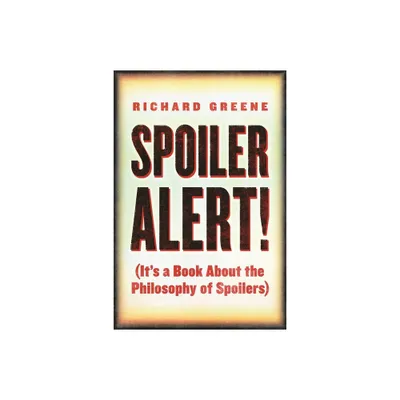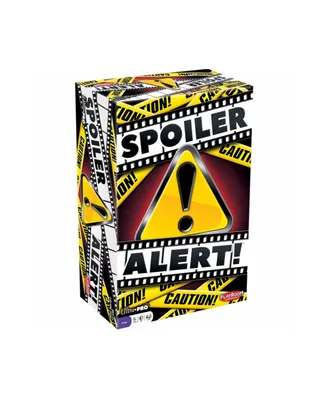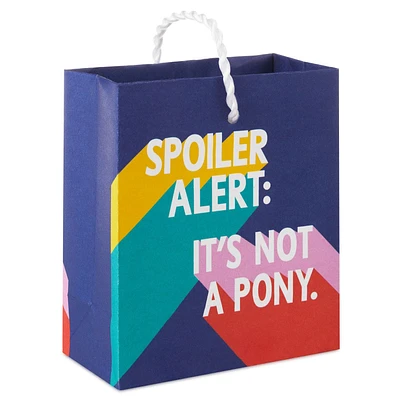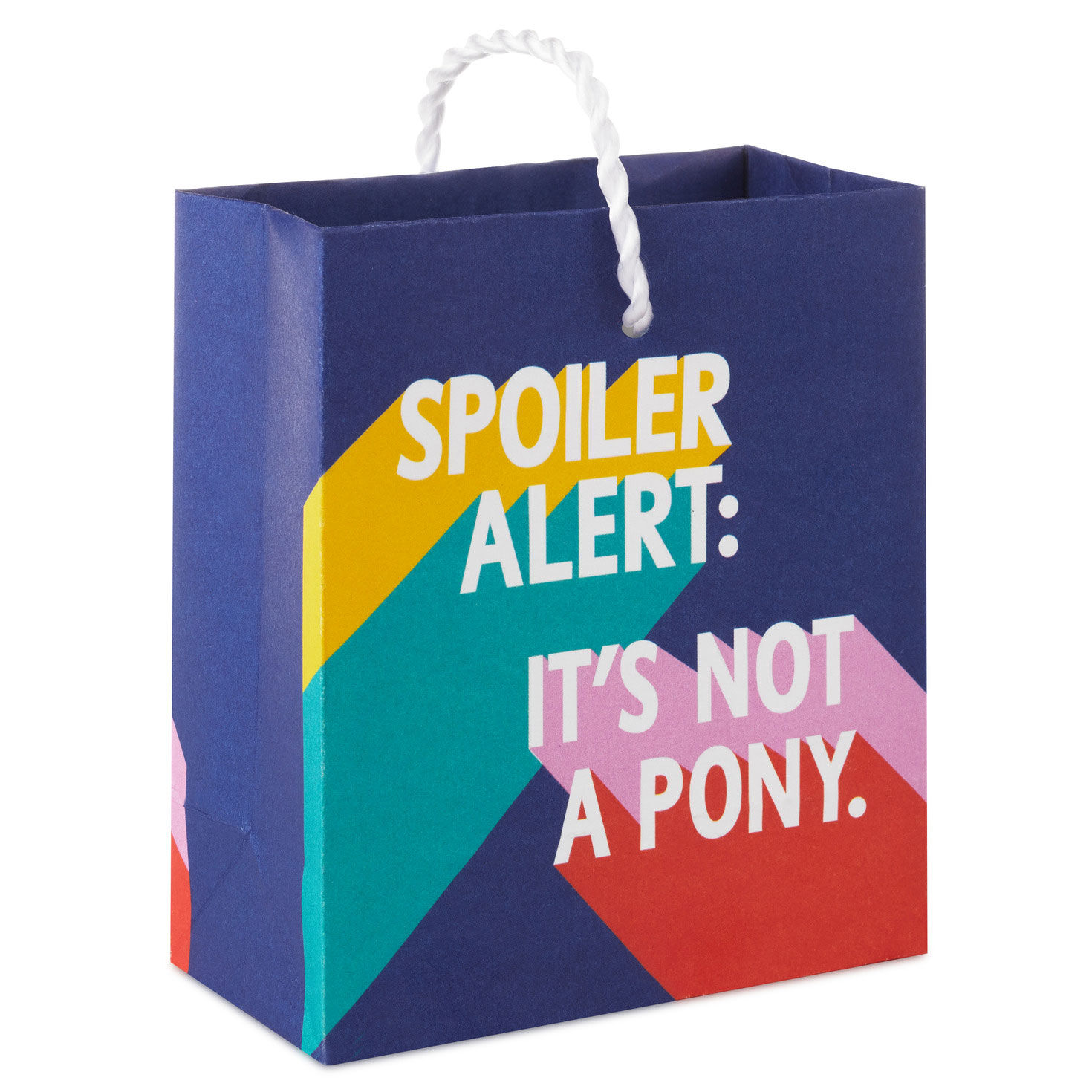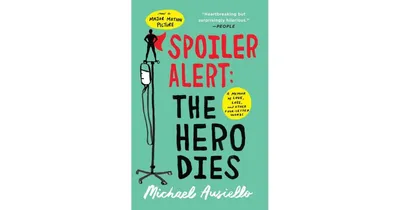Home
Spoiler Alert!: (It's a Book about the Philosophy of Spoilers)
Loading Inventory...
Barnes and Noble
Spoiler Alert!: (It's a Book about the Philosophy of Spoilers)
Current price: $19.95


Barnes and Noble
Spoiler Alert!: (It's a Book about the Philosophy of Spoilers)
Current price: $19.95
Loading Inventory...
Size: Paperback
*Product Information may vary - to confirm product availability, pricing, and additional information please contact Barnes and Noble
Spoilers get folks upset—really upset. One thing that follows from this is that if you pick up a book that’s all about spoilers, it may seriously disturb you. So anyone reading this book—or even dipping into it—does so at their peril.
Spoilers have a long history, going back to the time when some Greek theater-goer shouted “That’s Oedipus’s mom!” But spoilers didn’t use to be so intensely despised as they are today. The new, fierce hatred of spoilers is associated with the Golden Age of television and the ubiquity of DVR/Netflix/Hulu, and the like. Today, most people have their own personal “horror story” about the time when they were subject to the most unfair, unjust, outrageous, and unforgivable spoiler.
A first definition of spoiler might be
revealing any information about a work of fiction (in any form, such as a book, TV show, or movie) to someone who hasn’t encountered it.
But this isn’t quite good enough. It wouldn’t be a spoiler to say “The next
Star Trek
movie will include a Vulcan.” Nor would it be a spoiler to say, “The story of
Shawshank Redemption
comes from a short story by Stephen King.” There has to be something at least a bit unexpected or unpredictable about the information, and it has to be important to the content of the work. And you could perpetrate a spoiler by divulging information about something other than a work of fiction, for example details of a sports game, to someone who has tivoed the game but not yet watched it.
Timing and other matters of context may make the difference between a spoiler and a non-spoiler. It could be a spoiler to say “There’s a Vulcan in the next
movie” if spoken to someone raised in North Korea and knowing absolutely nothing about
. It can also be a spoiler to say something about a movie or TV show when it’s new, and not a spoiler when it has been around for some years.
This raises the distinction between “personal spoilers” and “impersonal spoilers.” Personal spoilers are spoilers for some particular individual, because of their circumstances. You should never give personal spoilers (such as when someone says that they have never seen a particular movie, even though the plot is common knowledge. You can’t tell them the plot).
Sometimes facts other than facts about a story can be spoilers, because they allow people to deduce something about the story. To reveal that a certain actor is not taking part in shooting the next episode may allow someone to jump to conclusions about the story. Spoilers need not be specific; they can be very vague. If you told someone there was a big surprise ending to
The Sixth Sense
or
Fight Club
, that might spoil these movies for people who haven’t seen them.
You can spoil by mentioning things that are common knowledge, if someone has missed out on that knowledge (“Luke and Darth Vader are related”), but you usually can’t be blamed for this. People have some obligation to keep up. This means that in general you can’t be blamed for spoilers about stories that are old. “Both Romeo and Juliet are dead at the end” could be a spoiler for someone, but you can’t be blamed for it. This is a rule that’s often observed: many publications have regulations forbidding the release of some types of spoilers for a precisely fixed time after a movie release.
However, some spoilers never expire, either because the plot twist is so vital or the work is so significant. So, if you’re talking to young kids, you probably should never say “Darth Vader is Luke’s father,” “Norman Bates is Mother,” “Dorothy’s trip to Oz was all a dream,” “All the passengers on the Orient Express collaborated in the murder,” “in
The Murder of Roger Akroyd
, the narrator did it,” “Soylent Green is people,” “
To Serve Man
is a cookbook,” and finally, what many consider to be the greatest and worst spoiler of them all, “The Planet of the Apes is really Earth.”
Some famous “spoilers” are not true spoilers. It’s not going to spoil
Citizen Kane
for anyone to say “Rosebud is his sled.” This piece of information is not truly significant. It’s more of a McGuffin than a plot twist.
A paradox about spoiling is that people often enjoy a work of fiction such as a Sherlock Holmes story over and over again. They remember the outline of the story, and who did the murder, but this doesn’t stop them re-reading. This demonstrates that the spoilage generated by spoilers is less than we might imagine.
It’s bad to spoil, but how bad? People do seem to exaggerate the dreadfulness of spoiling, compared with other examples of inconsiderateness or rudeness.
Are there occasions when it’s morally required to spoil? We Yes, you might want to dissuade someone from watching or reading something you believed might harm them somehow. Also, you might issue a spoiler in order to save the world from a terrorist attack (Yes, this is a philosophy book, so it has to include at least one totally absurd example). A more doubtful case is deliberate spoiling as a protest, as occurred with
Basic Instinct
.
The book ends with three spoiler lists: the Most Outrageous Spoiler “Horror Stories”; the Greatest Spoilers of All Time; and the Greatest Spoilers in Philosophy.
Spoilers have a long history, going back to the time when some Greek theater-goer shouted “That’s Oedipus’s mom!” But spoilers didn’t use to be so intensely despised as they are today. The new, fierce hatred of spoilers is associated with the Golden Age of television and the ubiquity of DVR/Netflix/Hulu, and the like. Today, most people have their own personal “horror story” about the time when they were subject to the most unfair, unjust, outrageous, and unforgivable spoiler.
A first definition of spoiler might be
revealing any information about a work of fiction (in any form, such as a book, TV show, or movie) to someone who hasn’t encountered it.
But this isn’t quite good enough. It wouldn’t be a spoiler to say “The next
Star Trek
movie will include a Vulcan.” Nor would it be a spoiler to say, “The story of
Shawshank Redemption
comes from a short story by Stephen King.” There has to be something at least a bit unexpected or unpredictable about the information, and it has to be important to the content of the work. And you could perpetrate a spoiler by divulging information about something other than a work of fiction, for example details of a sports game, to someone who has tivoed the game but not yet watched it.
Timing and other matters of context may make the difference between a spoiler and a non-spoiler. It could be a spoiler to say “There’s a Vulcan in the next
movie” if spoken to someone raised in North Korea and knowing absolutely nothing about
. It can also be a spoiler to say something about a movie or TV show when it’s new, and not a spoiler when it has been around for some years.
This raises the distinction between “personal spoilers” and “impersonal spoilers.” Personal spoilers are spoilers for some particular individual, because of their circumstances. You should never give personal spoilers (such as when someone says that they have never seen a particular movie, even though the plot is common knowledge. You can’t tell them the plot).
Sometimes facts other than facts about a story can be spoilers, because they allow people to deduce something about the story. To reveal that a certain actor is not taking part in shooting the next episode may allow someone to jump to conclusions about the story. Spoilers need not be specific; they can be very vague. If you told someone there was a big surprise ending to
The Sixth Sense
or
Fight Club
, that might spoil these movies for people who haven’t seen them.
You can spoil by mentioning things that are common knowledge, if someone has missed out on that knowledge (“Luke and Darth Vader are related”), but you usually can’t be blamed for this. People have some obligation to keep up. This means that in general you can’t be blamed for spoilers about stories that are old. “Both Romeo and Juliet are dead at the end” could be a spoiler for someone, but you can’t be blamed for it. This is a rule that’s often observed: many publications have regulations forbidding the release of some types of spoilers for a precisely fixed time after a movie release.
However, some spoilers never expire, either because the plot twist is so vital or the work is so significant. So, if you’re talking to young kids, you probably should never say “Darth Vader is Luke’s father,” “Norman Bates is Mother,” “Dorothy’s trip to Oz was all a dream,” “All the passengers on the Orient Express collaborated in the murder,” “in
The Murder of Roger Akroyd
, the narrator did it,” “Soylent Green is people,” “
To Serve Man
is a cookbook,” and finally, what many consider to be the greatest and worst spoiler of them all, “The Planet of the Apes is really Earth.”
Some famous “spoilers” are not true spoilers. It’s not going to spoil
Citizen Kane
for anyone to say “Rosebud is his sled.” This piece of information is not truly significant. It’s more of a McGuffin than a plot twist.
A paradox about spoiling is that people often enjoy a work of fiction such as a Sherlock Holmes story over and over again. They remember the outline of the story, and who did the murder, but this doesn’t stop them re-reading. This demonstrates that the spoilage generated by spoilers is less than we might imagine.
It’s bad to spoil, but how bad? People do seem to exaggerate the dreadfulness of spoiling, compared with other examples of inconsiderateness or rudeness.
Are there occasions when it’s morally required to spoil? We Yes, you might want to dissuade someone from watching or reading something you believed might harm them somehow. Also, you might issue a spoiler in order to save the world from a terrorist attack (Yes, this is a philosophy book, so it has to include at least one totally absurd example). A more doubtful case is deliberate spoiling as a protest, as occurred with
Basic Instinct
.
The book ends with three spoiler lists: the Most Outrageous Spoiler “Horror Stories”; the Greatest Spoilers of All Time; and the Greatest Spoilers in Philosophy.

